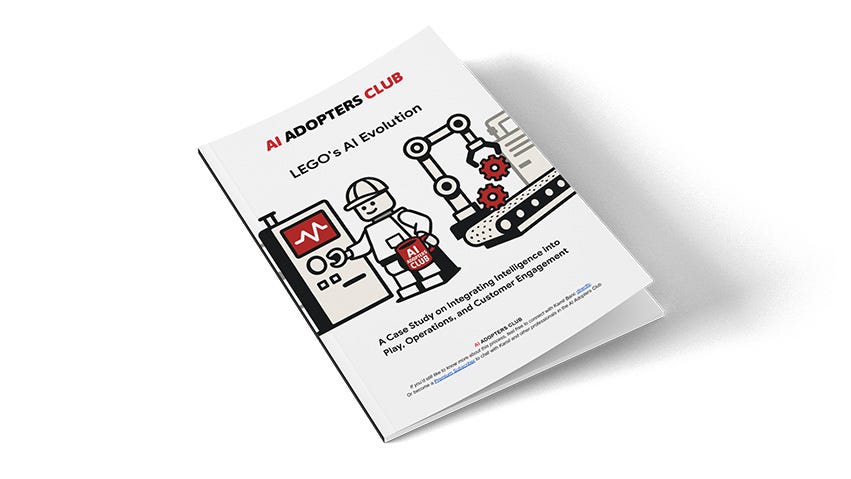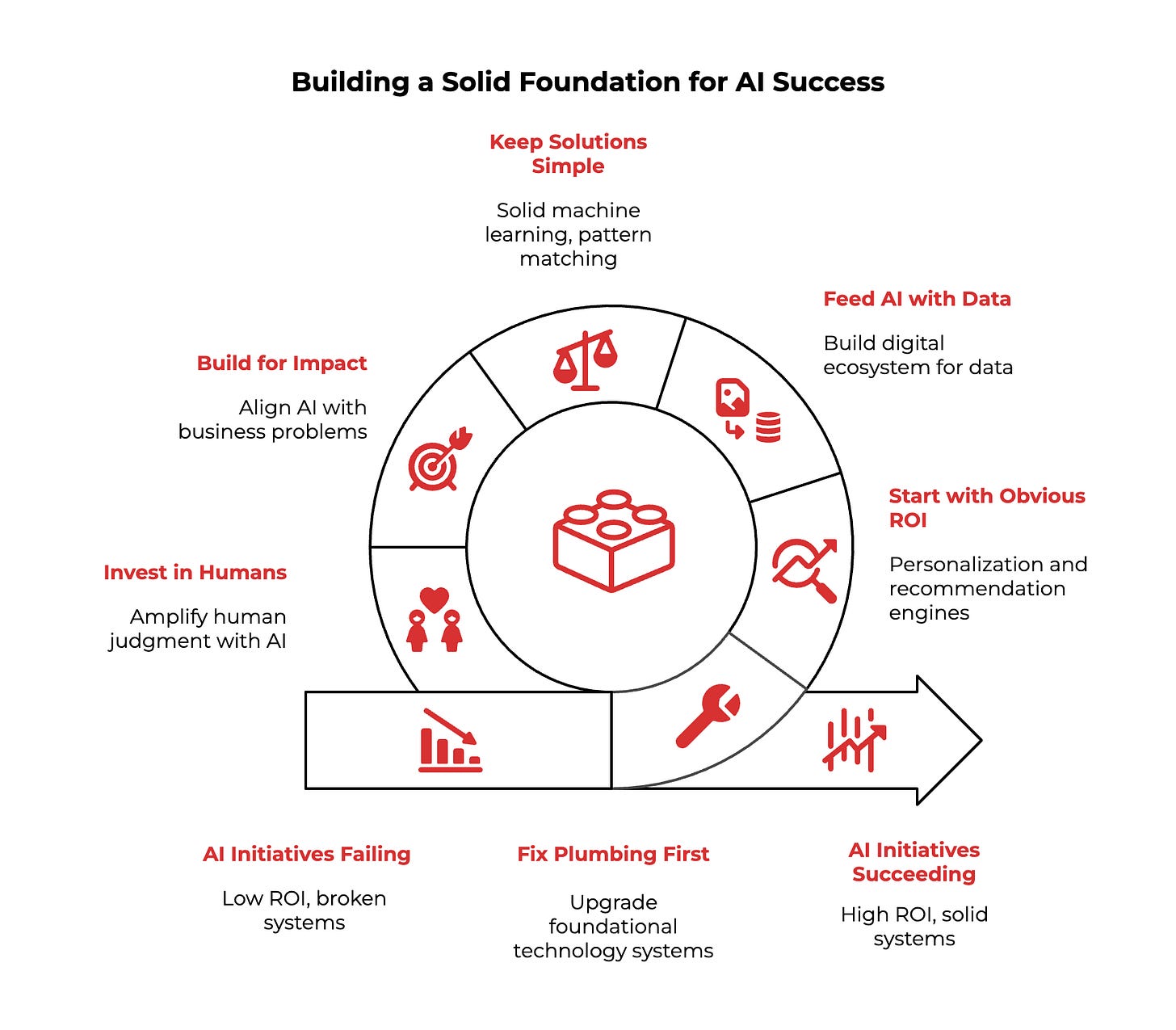LEGO's AI Playbook: Real Lessons From a $5B Digital Bet
The unglamorous truth about enterprise AI that actually works
Hey Adopter,
Remember when AI was going to revolutionize everything overnight? Yeah, about that.
While everyone's chasing shiny AI objects, LEGO quietly built something that actually works. They turned a 93-year-old plastic brick company into a digital powerhouse. Not with magic. Not with hype. But with the kind of boring, practical decisions that make CFOs smile and consultants cry.
Their secret? They did everything backwards from what the AI evangelists tell you.
They Fixed the Plumbing Before Installing the Jacuzzi
Here's what LEGO's leadership admitted: "we still keep learning. Translating business requirements into technical developments and deliveries is challenging".
That's corporate speak for "we had to fix a ton of basic stuff first."
Before they touched a single AI model, LEGO spent years modernizing their "foundational technology systems". We're talking ERP upgrades, cloud migrations, API development. The unsexy stuff that makes engineers groan and executives check their phones.
But here's the kicker: that foundation work is exactly why their AI initiatives actually delivered results. While your competitors are bolting AI onto broken systems, wondering why nothing works, LEGO built a house that could actually support the weight.
The takeaway for you: Stop trying to run before you can walk. If your data lives in Excel spreadsheets and your systems don't talk to each other, AI won't save you. It'll just fail faster.
What company would you like me to analyze next?
The 40% Conversion Lift Nobody Talks About
Everyone loves a good ROI story. Here's LEGO's: Their AI-powered recommendation engine boosted average order value by 15% in 2023. Their personalized email campaigns? 40% increase in conversion rates.
But before you rush to copy their playbook, understand what made it work:
They started where the money was obvious - personalization and recommendations aren't revolutionary. They're proven. LEGO didn't try to reinvent commerce; they just made it smarter.
They had the data to feed it - After years of building their digital ecosystem (LEGO.com, LEGO Life app, LEGO Ideas platform), they had first-party data most companies dream about.
They kept it simple - No complex neural networks predicting which brick a kid will want in 2030. Just solid machine learning doing what it does best: pattern matching at scale.
Want the Full LEGO AI Playbook?
This newsletter barely scratches the surface. The complete story includes:
How LEGO's brick recognition AI is revolutionizing their circular economy (and what it means for your sustainability goals)
The "LegoGPT" breakthrough that's redefining creative AI (Carnegie Mellon's model that actually builds stable structures)
Why LEGO created a separate $100M+ digital entity (and the gaming AI strategy nobody's talking about)
The complete 38-page case study with implementation frameworks, competitive analysis, and executive briefing
Bonus: Slide presentation ready for your next leadership meeting
Presentation:
The Brutal Truth About AI ROI
Here's where it gets real. LEGO's Chief Data Officer dropped this truth bomb: the average ROI for AI-focused investments across industries was only 2.5% last year.
Two. Point. Five. Percent.
That's not a typo. That's the reality most companies face when they throw money at AI without a plan.
LEGO's advice? "Build for impact, not perfection". They advocate for using pre-trained models, keeping solutions simple, and aligning AI with current business problems, not yesterday's PowerPoint dreams.
They Hired 1,200 People While Everyone Else Was Automating Jobs Away
In the ultimate plot twist, LEGO nearly tripled their digital team from 600 to 1,800 people between 2022 and 2025.
While Silicon Valley preaches automation and efficiency, LEGO invested in humans. Engineers, data scientists, UX designers, product managers. Real people who understand both the technology and the business.
Why? Because they learned what most companies haven't: AI doesn't replace human judgment. It amplifies it. But only if you have humans worth amplifying.
The Ethics Angle That's Actually Good Business
LEGO could have taken the Facebook approach to data and AI. Hoover up everything, apologize later. Instead, they built what might be the most comprehensive child safety framework in tech.
They partnered with UNICEF to create industry-first safety standards. Their LEGO Life platform uses AI to automatically reject photos containing children's faces. They even created an industry tool called the "Child Online Safety Assessment" that other companies can use.
Overcautious? Maybe. But when your brand is built on trust with parents, one data breach or AI mishap could destroy decades of goodwill. LEGO's ethics-first approach isn't just nice; it's a competitive moat.
The Supply Chain Success Everyone Ignores
While everyone obsesses over ChatGPT, LEGO quietly used machine learning to revolutionize their demand forecasting. They automated their retail stock placement systems, replacing manual spreadsheets with AI-driven logistics.
The result? Better inventory management, fewer stockouts, and happier retailers. Not sexy. Not revolutionary. Just millions in operational savings and better customer satisfaction.
This is the AI opportunity most companies miss. Stop looking for moonshots. Start looking for places where better predictions equal better margins.
Your Monday Morning AI Reality Check
LEGO's journey offers a masterclass in practical AI implementation. Here's your action plan:
Audit your foundations first - If your data is a mess and your systems are held together with duct tape, fix that before you even whisper "AI."
Start where the ROI is obvious - Personalization, demand forecasting, quality control. Proven use cases with clear success metrics.
Invest in people, not just platforms - LEGO's 1,800-person digital team isn't overhead. It's their competitive advantage.
Build ethics in from day one - It's easier to build trust than rebuild it. Especially if your customers include parents.
Learn fast and iterate - LEGO's philosophy of "learn fast and go again" beats any 5-year AI strategy.
Most AI initiatives fail because companies want the sizzle without doing the prep work. LEGO succeeded because they treated AI like any other business investment: with discipline, pragmatism, and a relentless focus on value.
They didn't try to out-tech the tech companies. They just asked, "How can this make our core business better?"
Sometimes the most revolutionary thing you can do is be utterly practical.
Adapt & Create,
Kamil







